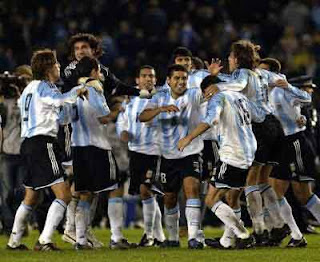
The group stage and quarterfinals are over and only four teams remain in the Copa America: Argentina, Mexico, Brazil, and Uruguay.
Brazil should win handily against the Uruguayans tomorrow night, but the Wednesday nigth match up between Argentina and Mexico should be a memorable encounter. Argentina has steamrolled all oponents in their path, scoring a remarkable 13 goals in just four games. However, Mexico, under the tutelage of Hugo Sanchez, has made magnificent strides this month. Besides Brazil Mexico appears to be the only team capable of taking on the Argentines. Mexico's fate rests on the shoulders of Nery Castillo, Mexico's new young talent (the man is one hell of a dribbler).
I think Argentina will win the encounter. There's just so much to be said about the Argentine team. Alfio 'the Coconut' Basile has assembled a breathtaking, attacking lineup; man for man they are undoubtedly th best team in the world. They don't just win and score goals, they do so with a style that makes even Brazilians' mouths salivate. The past for games they have consistently strung upwards of 15 passes together. The game is played on the field, one only needs to look at the 2002 World Cup to recognize that, but I hope Argentina wins, they deserve it.